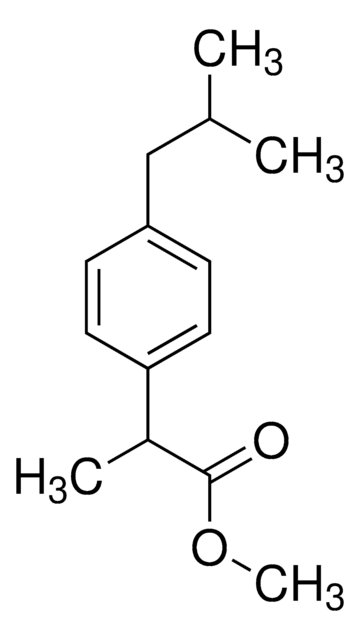13360-U
Lipid Removal Agent (LRA)
pkg of 500 g
Synonim(y):
polymeric adsorbent, XAD-2
Zaloguj sięWyświetlanie cen organizacyjnych i kontraktowych
About This Item
Polecane produkty
klasa czystości
reagent grade
Postać
powder
opakowanie
pkg of 500 g
metody
LPLC: suitable
powierzchnia
120 m2/g
macierz
Silica
grupa aktywna macierzy
silica
wielkość cząstki
325 mesh
wielkość porów
90 Å mean pore size
Opis ogólny
LRA, the synthetic adsorbent of crystalline calcium silicate hydrate is used for removing lipids and endotoxin from plasma or aqueous solutions. It is also used for DNA purification to remove protein, RNA and genomic DNA.
Zastosowanie
- Lipid removal agent (LRA) was used for absorption of lipids using gel permeation chromatography.
- LRA was used to isolate lipoprotein particles from coeluting proteins in collected fraction from Gel filtration chromatography.
This page may contain text that has been machine translated.
Kod klasy składowania
11 - Combustible Solids
Klasa zagrożenia wodnego (WGK)
WGK 1
Temperatura zapłonu (°F)
Not applicable
Temperatura zapłonu (°C)
Not applicable
Środki ochrony indywidualnej
dust mask type N95 (US), Eyeshields, Gloves
Wybierz jedną z najnowszych wersji:
Masz już ten produkt?
Dokumenty związane z niedawno zakupionymi produktami zostały zamieszczone w Bibliotece dokumentów.
Klienci oglądali również te produkty
Anita Krisko et al.
PLoS genetics, 9(9), e1003810-e1003810 (2013-09-27)
Although the genome contains all the information necessary for maintenance and perpetuation of life, it is the proteome that repairs, duplicates and expresses the genome and actually performs most cellular functions. Here we reveal strong phenotypes of physiological oxidative proteome
Anita Krisko et al.
Genome biology, 15(3), R44-R44 (2014-03-04)
The genetic code is redundant, meaning that most amino acids can be encoded by more than one codon. Highly expressed genes tend to use optimal codons to increase the accuracy and speed of translation. Thus, codon usage biases provide a
Scott M Gordon et al.
Journal of proteome research, 9(10), 5239-5249 (2010-08-20)
Plasma levels of high density lipoprotein cholesterol (HDL-C) are inversely proportional to the incidence of cardiovascular disease. Recent applications of modern proteomic technologies have identified upward of 50 distinct proteins associated with HDL particles with many of these newly discovered
John P Zhang et al.
Biotechnology progress, 21(4), 1220-1225 (2005-08-06)
A synthetic adsorbent of crystalline calcium silicate hydrate, the product LRA by Advanced Minerals Corp., has been studied for endotoxin removal from aqueous solutions. This adsorbent removes endotoxin effectively, and the removal is greatly enhanced by the presence of an
Stephen W C Chung et al.
Journal of chromatography. A, 1218(33), 5555-5567 (2011-07-12)
Organochlorine pesticide (OCP) residues in foods have been of concern for several decades. However, the analysis of some of the OCPs and their metabolites or derivatives, such as endrin aldehyde, endrin ketone, nonachlor, etc. in fatty foods (including foods of
Nasz zespół naukowców ma doświadczenie we wszystkich obszarach badań, w tym w naukach przyrodniczych, materiałoznawstwie, syntezie chemicznej, chromatografii, analityce i wielu innych dziedzinach.
Skontaktuj się z zespołem ds. pomocy technicznej





